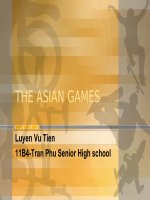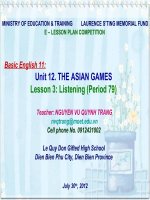Unit 12:The Asian games:Language focus
Bạn đang xem bản rút gọn của tài liệu. Xem và tải ngay bản đầy đủ của tài liệu tại đây (109.65 KB, 6 trang )
Lesson plan
Unit 12: The Asian games
Period: 5 Part E: Language focus
Trainee: Tran Thi Lan
Class: 11A6
Date of preparing 04/03/2010
Date of teaching: 06/03/2010
I. Objectives
By the end of the lesson, students will be able to:
- Distinguish the clusters /str/, /skr/, /skw/.
- Pronounce the words and dialogue containing these clusters correctly.
- Master the use of relative clauses and equivalent types of clauses without relative
pronouns.
- Use these structures correctly and appropriately to solve communicative tasks.
II. Materials: handouts, blackboard, textbook.
III. Anticipated problems:
Students may not have difficulty in pronouncing the clusters because they do not
exist in Vietnamese. Therefore, teacher should guide them to pronounce correctly.
IV: Procedures
Time Teacher’s activities Students’ activities
Warm-
up
5(mins)
- T greets the class:
+ Nice to meet you and How are you today?
+ Who’s absent today?
+ What have you learned in previous lesson?
-T: How do you pronounce these words?
+ Strength
+ Scratch
+ Squeal
- T: You will see these words in our lesson. And now, we
start our lesson today:
Unit 12: The Asian games
Lesson 5 Part E: Language focus
- Greet teacher and answer the
questions.
- Answer the teacher’s questions,
- Listen to the teacher and write
the title of the lesson on their
notebook.
1
Pronunc
iation
(10
mins)
- T: introduces some clusters such as /str/, /skr/, /skw/.
- T: guides Sts to produce these clusters: when
producing /str/, you should produce /s/ first and then
quickly switch to /tr/.
+ For example: street, strong, stream, stress…
+ The way of producing /skr/, /skw/ is the same.
- T: asks Sts to practice speaking these clusters.
- T: introduces some words which begin with these
clusters:
/str/ /skr/ /skw/
Street Scream Square
Strong Screen Squeeze
Strange Screw Squeak
Strength Scratch Squeal
- T: reads first then asks Sts to listen and repeat.
- T: asks Sts to listen to the teacher then to work in pairs
and take turn aloud the sentences on page 144.
Practicing reading aloud these sentences.
1. There was a strong man on the street at night.
2. The strong man looked very strange.
3. He was holding an ice-cream in one hand, and a rubber
doll in the other hand.
4. The man was eating the ice-cream, squeezing the doll
and it was squeaking.
5. The man was screaming while walking to the square.
6. Nobody knew why he was doing the strange things.
- T: goes around the class to see Sts practicing. Then T
calls some Sts to read again and gives them feedback.
- T asks Sts to practice speaking these clusters at home.
- Listen to the teacher.
- Practice speaking these clusters.
- Practice speaking /str/, /skr/,
/skw/.
- Listen and read after their
teacher
- Listen and repeat
- Work in pairs to practice
speaking
- Practice speaking these
sentences in 2 minutes
- Read the sentences again.
- Listen to their teacher’ s
feedback.
2
Gramma
r (14
mins)
I. REVISION OF RELATIVE PRONOUNS
-T: you have learned about relative pronouns. Today, let’s
review them.
-T: shows some examples on the screen.
Example:
1. The woman who/ that is wearing T-shirt is Tom’s teacher.
2. The street which leads to my village is not very wide.
=>They are the subjects of the clauses.
- T: now, Work in pairs to find out “What is the role of
these relative pronouns?”
-T: you have 1 minute to find out the role.
- When time is up, T calls some Sts to talk about the role.
-T corrects the answers if necessary.
-T: you have reviewed about relative pronouns, now let’s
practice more.
Practice: Complete the sentences using relative
pronouns as a subject.
1. The woman is very friendly. She lives next door.
=> The woman who lives next door is very friendly
2. Mary is a nurse. She works in Thai Nguyen hospital.
=> Mary, who works in Thai Nguyen hospital, is a nurse.
3. My sister bought me a computer. The computer is very
useful.
=> My sister bought me a computer which is very useful.
- T asks each student to do each sentence.
- T: introduces other examples:
Example:
1. The man whom you saw yesterday is my uncle.
2. The book which you gave me is interesting.
- T: asks students to answer “What is the role of these
relative pronouns?”
=> They are the objects of the clauses
- T: asks Sts to practice more:
Practice: Complete the sentences using relative
- Listen to their teacher.
-Look at the screen.
- Answer their teacher’s question.
- Sts work in pairs to find out the
role of these relative pronouns.
-Listen to their teacher’s
requirement.
- Read through all the sentences
and try to find out the answers.
-Do each sentence.
- Think about the answer.
- Practice more about using
relative pronouns as an
object.
3
pronouns as an object.
1. Please post these letters. I wrote them this morning.
=> Please post these letters which I wrote this morning
2. The meeting was interesting. I went to it yesterday.
=> The meeting which I went to yesterday was interesting
3. Peter is an actor. You met him last night.
=>Peter, whom you met last night, is an actor.
4. John doesn’t want to sell the house. He lives in it.
=> John doesn’t want to sell the house which he lives in.
- T: asks Sts to answer “Can we omit relative pronoun in
this case?”
Example:
The meeting was interesting. I went to it yesterday.
The meeting which I went to yesterday was
interesting.
→ The meeting I went to yesterday was interesting.
The omission of relative pronouns .
Notice: We can leave out the pronoun when it is not the
subject of the relative clause. Clauses without pronouns are
very common in informal English.
Practice :Rewrite these sentences using Omission of
relative pronouns:
1. That man is a teacher. I talked to him yesterday.
=> That man I talked to yesterday is a teacher
2. Sa pa is the beautiful place. I was born in it.
=> Sa pa is the beautiful place I was born in
3. The girl is from Brazil. We are going to see her.
=> The girl we are going to see is from Brazil
4. This is the book. John gave it to me last week.
=> This is the book John gave to me last week
5. The bed was very modern. I slept in it last night.
=> The bed I slept in last night was very modern
- Try to think about their
teacher’s question.
-Listen to their teacher’s
explanation.
- Do other sentences
4
8 (mins)
-T calls one student to read aloud the requirement of
exercise 1,2 and the sentences in the box.
Exercise 1: Complete each of the following
sentences, using a suitable sentence in the box to
make a relative clause without a relative
pronoun.
-
T: explains the requirement and then do example:
Example:
I like the diamond ring………………………
=> Mary is wearing
-T: analyze the example and asks Sts to work in pairs.
-T: you have 2 mins to do sentences 1, 2, 3.
-T goes around the class to observe the students to do.
-When time is up, T calls some Sts to go to the board to
write their answers.
-T checks Sts’ answers.
Keys:
1. you lost
2. he invited to the birthday party
3. John told
- T asks Sts to do other sentences at home.
-T: let’s move on exercice 3:
-Read the requirement of exercise
1.
-Listen to their teacher.
- Look through all sentences
- Work in pairs.
-Answer their teacher’ question.
We had it for lunch we met him this
morning
John told them he invited them to
the birthday party
You lost it I bought it yesterday
5
5 (mins)
Exercise 3: Tick (ü) the sentences in which the
relative pronoun can be omitted.
-T calls one student to read aloud the requirement of
Exercise 3.
- T explains new words if any.
- T asks Sts to work in pairs to discuss to do the exercise.
-T: you have 2 mins to do sentences 1, 2, 3.
-T goes around the class to observe the students to do.
-When time is up, T calls some Sts to go to the board to
write their answers.
-T checks Sts’ answers.
Keys:
1. Yes 3. Yes 5. Yes
2. No 4. Yes 6. Yes
- Read the requirement of
exercise 3.
- Listen to their teacher.
- Work in pairs.
- Go to the board to write their
answers.
-Listen to their teacher’s answer.
Wrappin
g-up
(3 mins)
- T summarizes the main points:
+ Distinguish the clusters /str /, / skr /, and /skw /.
+ Pronounce the words and sentences containing these
clusters correctly.
+ Master the use of relative clauses and equivalent types of
clauses without relative pronouns.
+ Use these structures correctly and appropriately to solve
communicative tasks.
- T asks students to do homework:
+Do exercise 1, 2, and 3 again.
+Prepare for Reading of Unit 13.
- T says goodbye to the class.
-Repeat the main points
- Write the contents of
homework.
6









